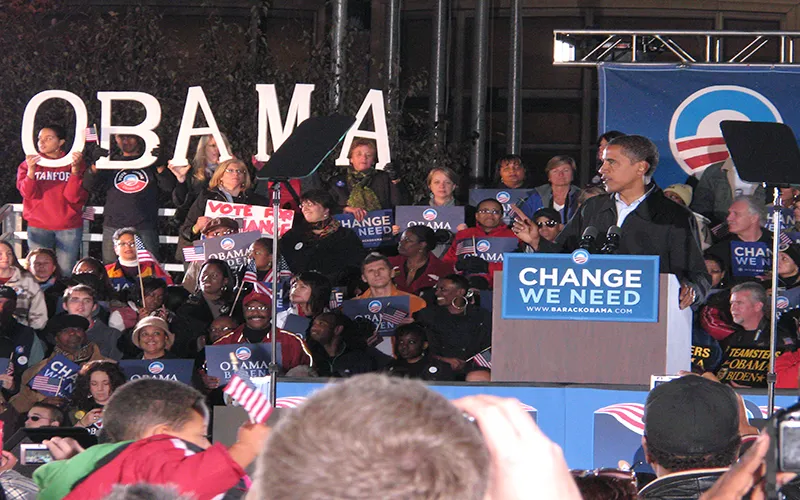"The flurry of activities in the Democratic and the Republican camps during the run-up to the US presidential elections produces some memorable and some not so memorable political slogans. Some of these campaign slogans fighting for voters' attention might sound like tongue twisters and some, cheap advertising gimmicks. However, some of the most successful slogans have clearly captured their times and the imagination of the American voters. Producing campaign slogans is a serious business, and over the years, slogans have become an inevitable part of presidential campaigns. In fact, no campaign is complete without a catchy and timely slogan that is brief and reflects the overwhelming mood of the time, often anti-incumbent but optimistic as well.
The Obama campaign in 2008 astutely managed to capture the feelings of the American people who wanted a change from the wars that America had fought under the Bush administration. Obama's slogans like ""Change we can believe in"" and ""Yes we can"" used the unpopularity of the Bush administration and rallied the people for a change. Obama became a personification of that change who besides being the first African American president, also promised to end the costly wars America was fighting. In his re-election campaign, when Obama had to campaign against the backdrop of a rather chequered four years behind him, he successfully relied on a one word campaign call ""Forward."" It signified the message that he had set the country on the path to economic recovery, and that he should be given four more years to take it forward.
During re-election campaigns, voters are usually reminded of the achievement of the candidate's presidency and also of how the country would fare better under his stewardship. More than any other president, Franklin D. Roosevelt's four terms at the Oval Office has been a matter of recurring debate in the history of modern American presidency. From the New Deal to victory at World War II, he rode like a colossus on the scene, finally leading to the 22nd amendment of the US constitution that forbade anyone from running for the office after serving two terms. While running for his third term in 1940, Roosevelt used the slogan ""Better a third term than a third-rater."" Another slogan that tried to bring home the importance of having reliable leaders at the helm of affairs, especially during trying times, was Abraham Lincoln's popular Civil War era slogan ""Don't swap horses in midstream"" during his second term campaign in 1864. Using a phrase that might have sounded problematic in other times, Civil War hero of the Union Army Ulysses S. Grant told voters to ""Vote as You Shot"" in 1868.
Before America's direct involvement in World War I, Woodrow Wilson had campaigned for his re-election bid in 1916 with ""He Kept Us Out of War"" and his successor Warren Harding after the horrors of the war, rallied voters with ""Return to Normalcy"". Herbert Hoover in 1928 attracted voters with the catchy ""A chicken in every pot and a car in every garage"". But when the Great Depression struck, Americans began discovering that the chicken had no meat and the car had to be sold so they could eat. Hence, in 1932, Americans found hope for better times in Roosevelt's promising catchphrase ""Happy Days Are Here Again."" One of the more memorable slogans in the history of US presidential campaigns remains ""We Polked you in '44, we shall Pierce you in '52."" In 1852, it helped catapult a lesser known candidate Franklin Pierce using the legacy of another little known candidate who went on to become a popular president James K. Polk.
No campaign can ignore the importance of a catchy and relevant slogan, something that in simple layman's language reflects the mood of the times, mostly portraying a candidate as the man of the times, as the problem solver. The slogan should be inclusive, appeal to the hearts and minds of voters. Perhaps, in an eerie foretelling of the times to come when Facebook's 'Like' campaigns would be significant in virtual popularity, Dwight D. Eisenhower's campaign in 1952, cashing on the war-hero image of the candidate, used the now legendary campaign line ""I like Ike"" (Eisenhower was popularly known as Ike).
One of the most memorable campaign lines was the one used by Ronald Reagan in 1980, against the backdrop of a not-so-admirable presidency of Jimmy Carter and the bad economic conditions in the country. Reagan, invoking the mood of the voters, had said, ""I think when you make that decision, it might be well if you would ask yourself, are you better off than you were four years ago?"" Since then, these simple but evocative lines have been recurrent in many election cycles in the United States. In other words, campaign slogans reflect the fundamental ambition of the candidate and the context in which the campaign is being run. They are simple but not generic. They need to have a personality and help voters identify their candidates more easily. They help in branding candidates. Bill Clinton's now famous lines ""It's the economy, stupid"" that emerged during his 1992 campaign clearly conveyed the priority for the United States, and the candidate: to rejuvenate the US economy.
As the election season heats up, more campaign slogans will fill the airwaves. Some of them would be used by the candidates themselves and their official campaigns, others may come from supporters, which will either remain or fade away depending on their popularity. Some of the more quality slogans one gets to hear in the current campaign trail are Mike Huckabee's ""From Hope to Higher Ground"". It has a religious swing to it, that might have some good recall value for conservative voters and it offers something beyond Obama's ""hope"", as in ""a higher ground"". Other slogans like Rand Paul's ""Defeat the Washington Machine. Unleash the American Dream"" and Bernie Sander's ""A Political Revolution is Coming"" reflects the personalities of the candidates and their political priorities.
Eric Swartz, president of Tagline Guru that recently released its survey of the best and the worst slogans of the current crop of presidential contenders of both parties said, ""Political slogans still have marquee value on the national stage and can shape our perceptions of the candidates.... To be memorable, a slogan has to be catchy. To be politically effective, however, it needs to be authentic....Slogans that ranked highly were acknowledged for being clear, positive, believable, and aspirational. On the other hand, slogans that fared poorly were criticized for their lack of originality and genuine feeling, their appeal to fear rather than hope, and their inability to express an exciting idea."""
The views expressed above belong to the author(s). ORF research and analyses now available on Telegram! Click here to access our curated content — blogs, longforms and interviews.




 PREV
PREV

